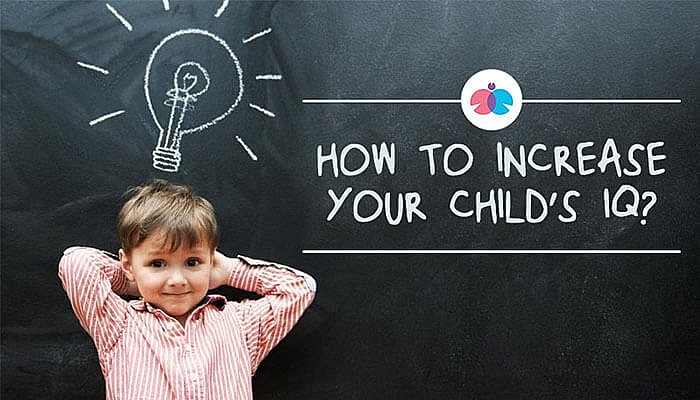4 Simple Ways to Increase IQ for Kids: Play Games, Read Books, Exercise and Talk
 |
| How to Increase IQ for Kids |
What is IQ?
IQ or Intelligence Quotient is a total score derived from several standardized tests designed to assess human intelligence. Historically, IQ is a score obtained by dividing a person's mental age score, obtained by administering an intelligence test, by the person's chronological age, both expressed in terms of years and months.
It essentially reflects how well you did on a specific test as compared to other people of your age group. While tests may vary, the average IQ on many tests is 100, and 68 percent of scores lie somewhere between 85 and 115.
Sometimes people with very high IQs do not fare so well in life, while those with average IQs may thrive.
How to Increase IQ for Kids With Easy Ways
If parents grasp the golden period of brain development and practice the following habits, the child's intelligence will be improved very quickly.
In addition to innate factors, a child's IQ is determined by the environment and family. Each child will have only one peak period to develop brain IQ.
A set of research data from Harvard Medical School, affiliated with Harvard University shows that 5-6 years old is the time when a child's brain develops to 80-85% of its full development. This means that 0-6 years old is a very important period of brain development. So how to stimulate children's intelligence in childhood days?
Here are some suggestions offered by Harvard University.
Tragedy of William James Sidis - Smartest Person Ever Lived in the World
| How does a child's brain develop? From before birth to age 4, an infant's brain grows explosively. In fact, your child's brain has reached 90% of its adult size before kindergarten. This period of great growth provides an ideal window of opportunity for learning. But the brain doesn't stop developing at age 4. It continues to organize and restructure throughout childhood and on into early adult life, becoming more complex. Unfortunately, knowing about the brain's early growth has prompted many parents to panic about their child's IQ or push their kids into "primo preschools." |
1. Exercise
In the book "Exercise Transforms the Brain" by Associate Professor John Reddy from Harvard Medical School mentioned the link between exercise and the brain. After 20 years of research on this issue, he came to the conclusion: "Exercise not only strengthens the body, but also strengthens the brain and makes children smarter."
He applied research results into practice and achieved certain results. Like the physical education program for 19,000 students of Professor Reddy at a school in suburban Chicago.
The results show that not only helps children stay healthy, but the children of this school have ranked 6th in math and 1st in science and technology in the international math and technology trends research project, was held around the world in 1999 with the participation of 23,000 students.
Exercise also speeds up the brain. Experiments applied to mice showed that those that were exercised, the hippocampus had 15% greater memory function and 9% heavier weight than the non-exercised mice.
Therefore, it is effective for children to do exercises after exercise. Some famous schools in Beijing give their children a homework assignment of skipping rope. Because this is one of the exercises to improve children's memory. In addition, table tennis is also a brain-strengthening exercise and can prevent nearsightedness.
So, how to make exercise a part of your child's daily routine:
- First, parents should actively lead their children to exercise. It's time to start this as early as possible because children are always ready to do many things with their parents.
- Second, allow children to participate in sports before school.
- Third, encourage and support children to participate in sports with friends
2. Play Games
 |
| Play Games to Increase IQ |
Professor Hong Lan (China), a brain scientist has shown that games are not the enemy of learning. They are partners of learning and nutrients for brain development.
Children who can participate in games have higher emotional intelligence because they learn to get along with people in group games.
Games can cultivate children's basic abilities, influence cognitive, language, emotional, personality development... and promote children's physical and mental health.
Of course, letting your child get into the game is not good, but playing the game for the right amount of time brings many benefits.
| No matter how much we stop our kids from playing games on our mobile, they still do that. What you can do is download games that improve the brain function and IQ of the kids. There are many brain games available online to choose from. |
5 Best Educational Games for 6 Year old Kids
3. Reading Books
Educator Suhomlinsky once said: "The way to make children smarter is not to make up their heads or increase the amount of homework, but to spend more time reading." A study published in the Journal of Psychological Science January 2012 concluded that reading to children combined with interaction can increase children's IQ by more than 6 points.
In fact, a survey of the lifestyle habits of 177 billionaires found that their biggest thing in common is reading. Professor Hong Lan also pointed out that children who are able to read early have greater learning potential.
Reading is the fastest way to absorb information, the eye can read 668 words/minute. The fastest speaking is only about 250 words/minute while reading is 3 times faster.
In this professor's view, speaking is instinctive and reading is a habit. Reading is a way to help children calm down, look deeply into the world and it is an infinite extension to their intellectual development.
4. Parents Talk to Kids
Scientists from the Massachusetts Institute of Technology, Harvard University and the University of Pennsylvania have found that it's not the curriculum that affects a child's brain development, but the way parents communicate and interact with their children. female.
The more often children talk to their parents, the more active the cerebral cortex is. This keeps their cortex active and helps them score high on tests of language, comprehension and more...
However, this was not related to factors such as family economic conditions or parents' educational attainment.
Nobel Prize winner in Physics, Richard Feynman mentioned in his autobiography that his success was due to the influence of his father.
"Dad used to teach me by giving various examples and discussing them. He didn't pressure me, just relaxed, fun discussions. This has inspired me all my life. and gave me a taste of all the fields of science I was interested in. As a child, I enjoyed conversations with my father."
It can be said that it was Dad's great conversational ability that led to a Richard Feynman winning the Nobel Prize in Physics.
| Advices of Bryan Roche, Ph.D., a behavioral psychologist "The more conversations you have with your child, the more intelligent they will be," Roche writes. Playing simple teaching games along the way, for instance asking them to name or count objects, boosts their intelligence even more. "You can raise your child's IQ by six points by simply doing this over a few years when they are young," Roche writes. Start as early as you can, he adds. The evidence suggests that, while still beneficial, you won't get as big a benefit if you start after your child is four. Reading to children is highly beneficial too. "Kids whose parents read to them most days have higher IQs," Roche writes. This is especially true if you make reading an interactive process, rather than one where the child simply listens |























